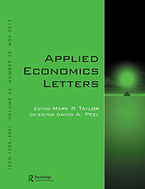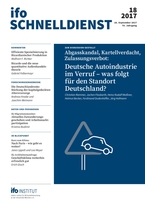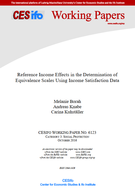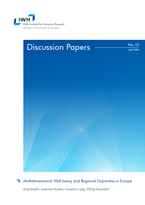New Publications
Applied Economics Letters: "There and back again - estimating equivalence scales with measurement error" (Borah, Knabe)
New publication by Melanie Borah and Andreas Knabe:
|
Using income satisfaction data from the German Socio-Economic Panel, we find large differences in the equivalence weight of a partner when it is being estimated by direct and reverse regressions. We argue that neither of the two models will produce consistent estimates when there is stochastic error in satisfaction and measurement error in incomes. We propose a correction of mismeasured incomes using a constructed alternative income measure. The corrected results are relatively close to those obtained from direct regression. We do not find evidence that previous studies, using the direct regression method, severely suffer from measurement error in incomes.
The publication can be found here. |
 |
The Deutschlandrente: A concept for strengthening private funded retirement provision
New publication by Andreas Knabe and Joachim Weimann:
|
Andreas Knabe and Joachim Weimann, together with the state government of Hesse, have developed a reform proposal for strengthening private funded retirement provision in Germany ("Deutschland-Rente"). In a new article, which has just been published in the ifo Schnelldienst, they discuss this concept in detail.
The publication can be found here. |
 |
CESifo Working Papers: "Reference Income Effects in the Determination of Equivalence Scales Using Income Satisfaction Data"
New working paper by Melanie Borah, Andreas Knabe and Carina Kuhställer:
|
The authors investigate the importance of reference effects in the estimation of equivalence scales from data on income satisfaction. The study shows that the separation of needs-based and reference effects helps to overcome a potential bias that causes an overestimation of adults' and an underestimation of children's needs. This result is confirmed by conducting an empirical analysis of data from the German Socio-Economic Panel, where controlling for income comparisons eliminates the gap between equivalence scale parameters for adults and children.
The working paper can be found here. |
 |
Economics Bulletin: "Reconsidering the interrelated dynamics of unemployment and low-wage employment in Great Britain"
|
Stewart (2007, JAE) finds that being employed at low wages (compared to higher wages) increases the risk of future unemployment. The risk of unemployment does not differ significantly between current low-wage employment and current unemployment. The author concludes that 'in terms of future employment prospects, low wages are closer to unemployment than to higher-paid jobs' (p. 529). Alexander Plum shows in this paper that the result depends strongly on the thershold used to distinguish between high and low wages: applying this widely used OECD (1997) definition of low-wages substantially changes the findings of Steward (2007). With this threshold, Plum finds that low wages are helpful for significantly reducing the risk of future unemployment compared to unemployment. Moreover, the categorization of the unemployed, the included variables with reference to the educational background, the age and the age restrictions imposed on the sample and switching from gross hourly wages in nominal terms to real terms have an impact on the findings
The publication can be found here. |
 |
IWH Discussion Papers: "Multidimensional Well-being and Regional Disparities in Europe"
New publication by Jörg Döpke, Andreas Knabe, Cornelia Lang and Philip Maschke:
|
In this new paper, Andreas Knabe (together with colleagues from Halle and Merseburg) analyzes how social well-being “beyond GDP” can be measured at the regional level. Using data from the OECD Regional Well-Being Index, the paper discusses various aggregation mechanisms to obtain well-being rankings and analyzes their potential implications for the allocation of EU regional funds.
The paper can be found here. |
 |